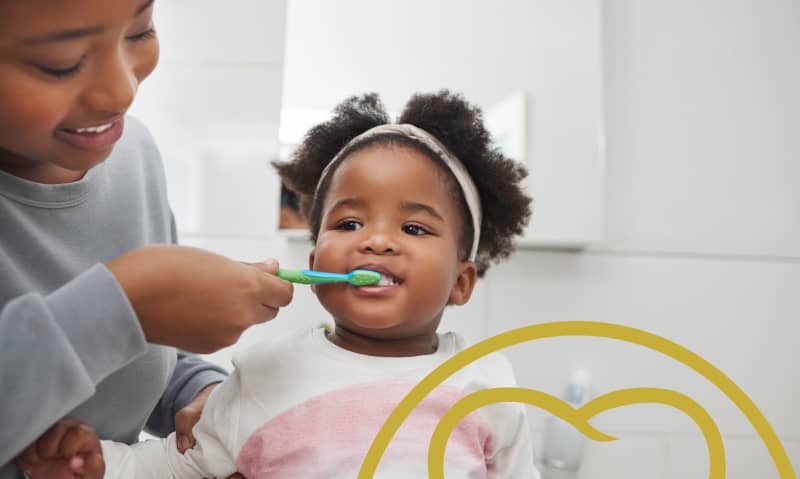Get Your Baby’s Dental Health Started on the Right Foot

Your baby’s first dental visit should be sooner than you think.
Infants will typically get their first tooth at around six months old. Their subsequent baby teeth follow shortly after that, and it’s important that these teeth stay clean and healthy. For this reason and many others, it’s advised that parents bring their baby in for their first dental visit no later than their first birthday (but around the time their first tooth erupts is even better). The team at Dixon, Boles & Associates is ready to meet your child as soon as their teeth begin to erupt so they can get your little one’s dental health journey started on the right foot.
The First Visit
Similar to how regular doctor checkups are important, routine dental checkups are important, too, and they should begin sooner than most parents think. A baby’s first dental visit should be no more than six months after the eruption of the child’s first tooth or no later than their first birthday—whichever comes first.
At your child’s first dental visit, a dentist at Dixon, Boles & Associates will review your child’s health history. You will sit in the dental chair with your child on your lap, and a dental assistant will make sure everyone is comfortable while the dentist evaluates the child’s mouth, jaw, and any teeth that have erupted. After the evaluation, a dental hygienist will clean your child’s teeth and show you how to properly care for them as well. And then you’ll be all set for another six months!
During the evaluation, we encourage parents to ask questions about their baby’s oral health and the development of their teeth.
When do my baby’s teeth come in?
Each child’s body develops at their own pace, and the same goes for their teeth. You can’t compare one child to another child because they all mature on their own time.
In general, a baby’s first tooth normally erupts when they are around six to nine months old. Usually, the first two teeth to break through the gums are the two bottom front teeth, known as the central incisors. The next teeth to erupt are usually the four top front teeth, known as the central and lateral incisors. Your child’s primary, or baby, teeth will fill in the rest of their mouth, usually in pairs, through the age of about 30 months, with the molars being the last teeth to emerge. A child has 20 primary teeth in total, and they should all have come in by the time they are three years old.
How long does it take for my child’s teeth to come in?
As a general rule, most dentists say a child should erupt four teeth about every six months. That doesn’t mean four teeth will come in every six months; that just means you should notice four new teeth erupting in your child’s month within a six-month time period.
When do a child’s baby teeth fall out?
A child usually starts to lose their baby teeth around the age of six, and the teeth often fall out in the order they came in, so the front incisors normally fall out first. A child’s molars are normally the last teeth to fall out, and the permanent set of second molars might not grow in until the child is 12 or 13 years old.
How do I clean my baby’s teeth at home?
A parent can actually begin cleaning their child’s gums before their baby teeth emerge! Many dentists recommend using a clean, damp washcloth to gently massage the baby’s gums. This will get the child used to having something in their mouth and prepare them for the use of a toothbrush.
Once your child’s first tooth has erupted, you can begin brushing their teeth twice a day with a small toothbrush designed especially for babies. The toothbrush should have ultra soft bristles. Keep in mind that until the child is about two years old, or until you are advised by your dentist, you should just use water to brush your baby’s teeth. The method is still the same: small circles on all surfaces of the child’s teeth.
Once a child is about two years old and understands how to spit, that is when a toothpaste with added fluoride can be used, but parents only need to put an amount about the size of a grain of rice on the toothbrush for toddlers.
Does nursing cause tooth decay?
Like adult teeth, a child’s primary teeth are susceptible to cavities without proper oral hygiene, and one of the main ways this can develop is from baby bottle tooth decay.
Baby bottle tooth decay often happens in the child’s front teeth and is caused by the teeth’s prolonged exposure to food or drink that contains sugar. Tooth decay can also happen if a baby is put to bed with a bottle, as the saliva that is created in the mouth can encourage the growth of bacteria that can cause tooth decay.
The best way to prevent baby bottle tooth decay is to limit the amount of sugar in the foods your child consumes and to brush their teeth at least twice a day, if not after every meal.
The team at Dixon, Boles and Associates can start your baby’s oral health journey right.
If your child’s first tooth is starting to come in or if they’ve already had a few grow in, now’s the time to make an appointment so your child’s teeth can be evaluated. Early visits mean early prevention and a healthy smile for life! Give us a call or visit us online to schedule an appointment.